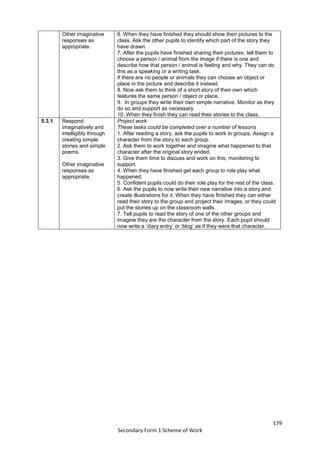The document provides guidance for teachers on the Secondary Form 1 English Language curriculum. It includes:
1. An overview of the contents of the Scheme of Work document which will help teachers plan their lessons.
2. An explanation of how the 112 total lessons are organized, including textbook-based, non-textbook based, and sample lessons.
3. Details on the structure of the textbook-based and non-textbook based lesson cycles and the skills/topics covered in each.
4. Supporting information and definitions for terms from the curriculum to help teachers understand standards and objectives.
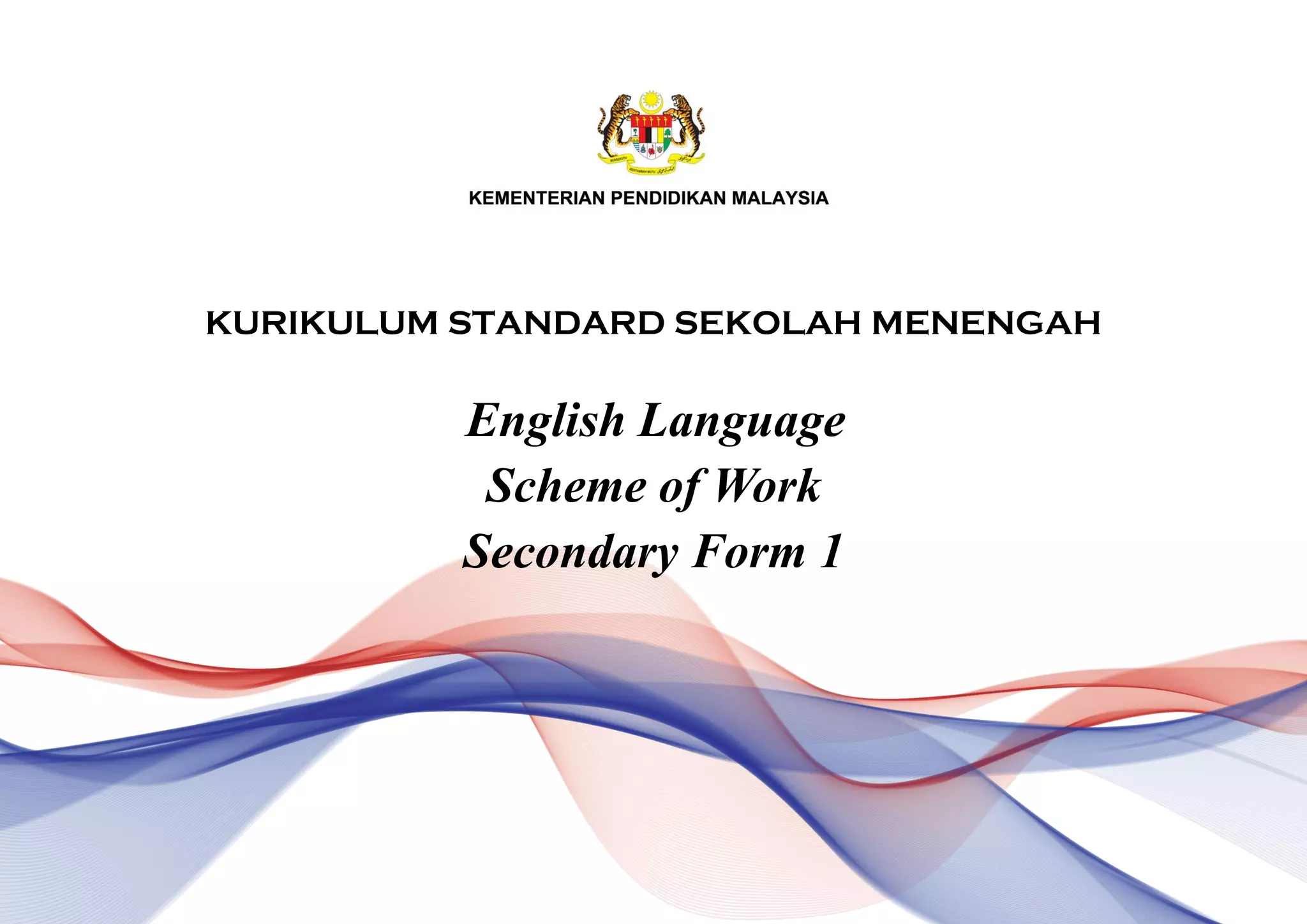


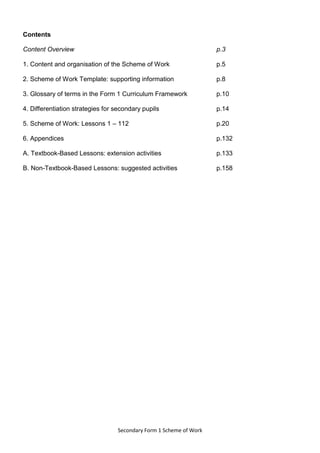
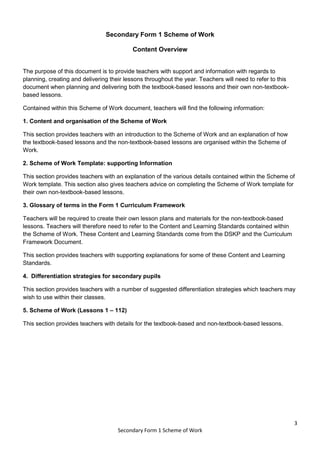
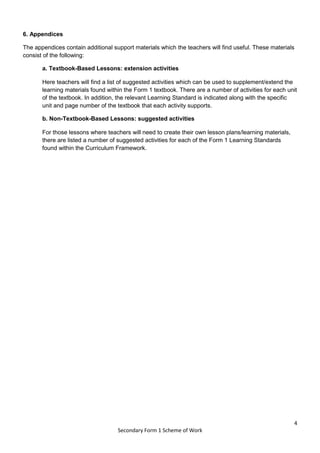
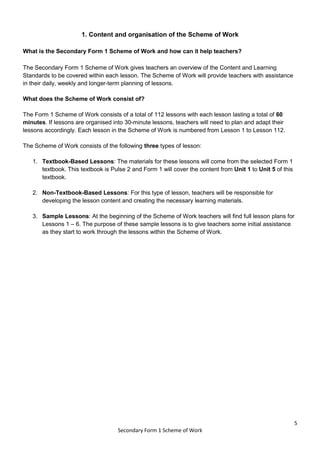
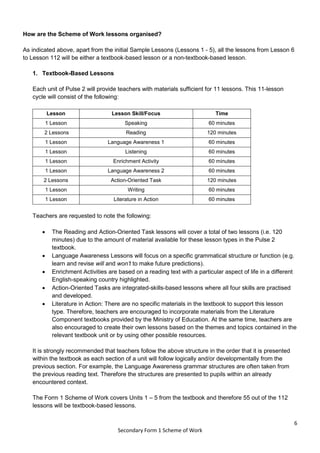
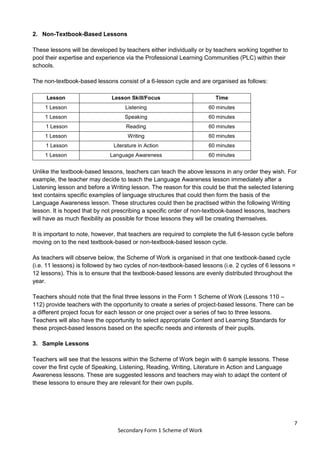
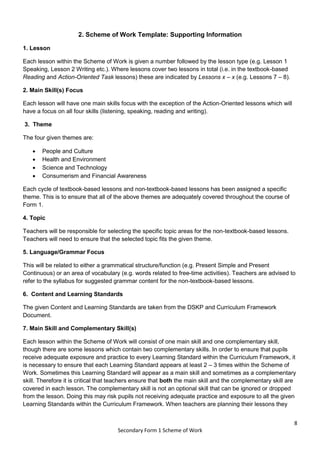
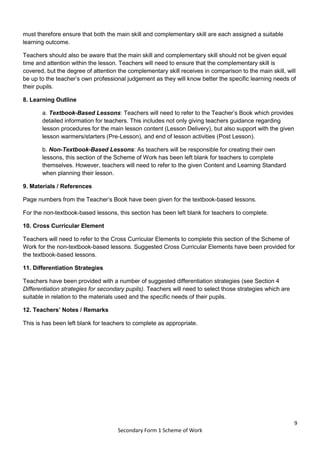
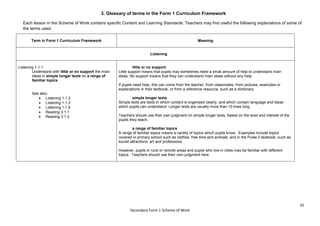
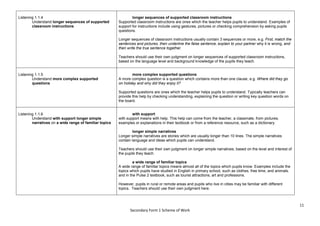
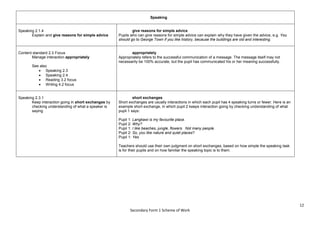
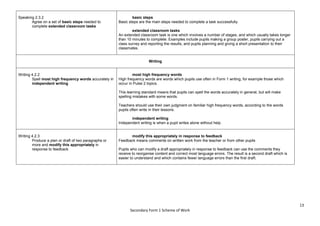
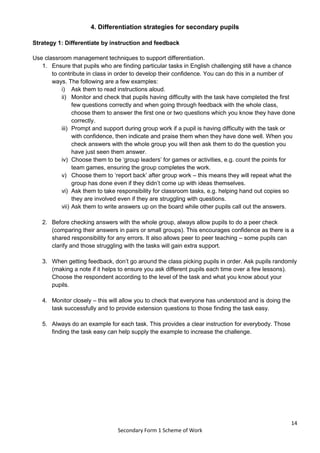
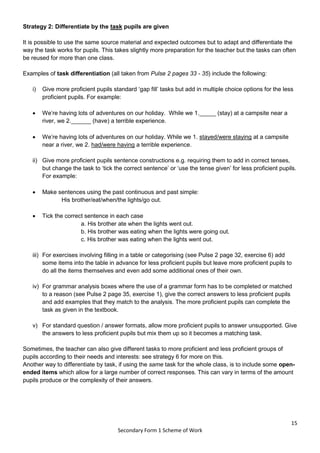
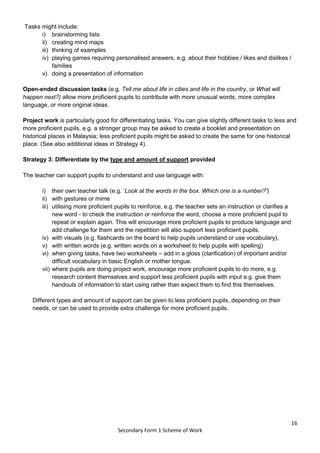
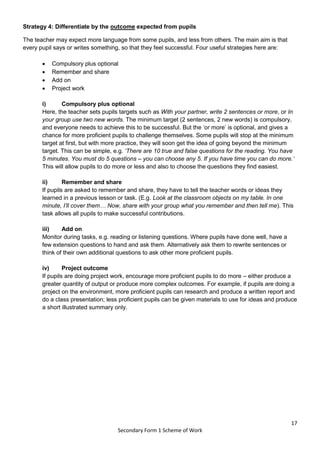
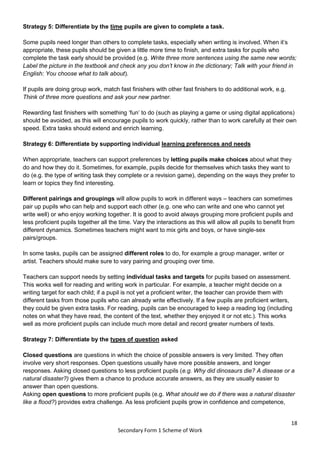
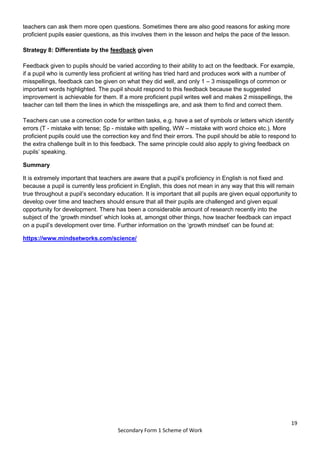
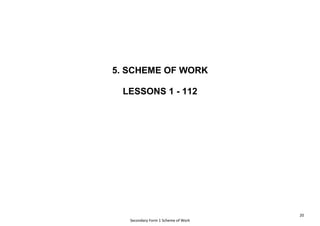
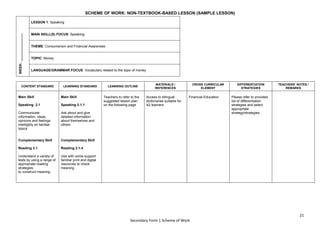
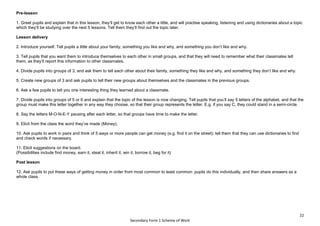
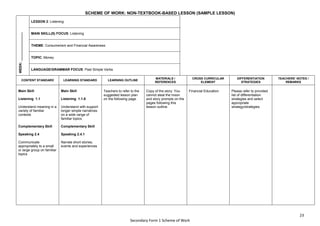
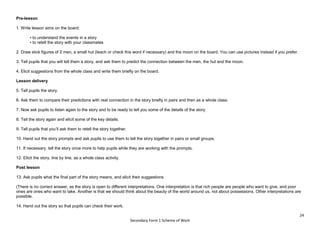
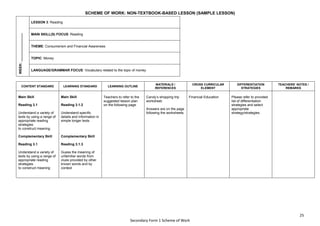
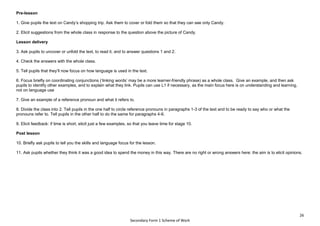
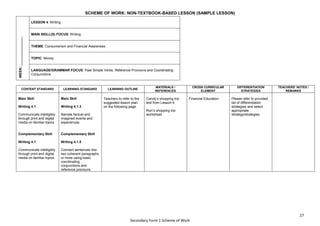
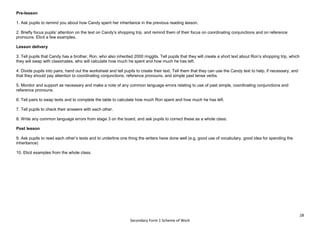
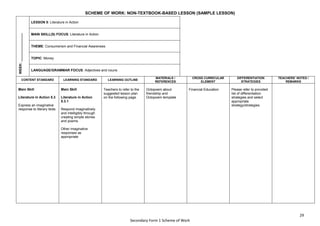
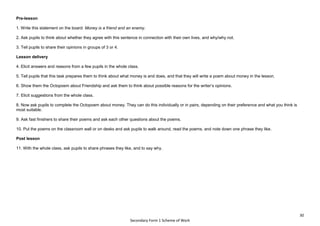
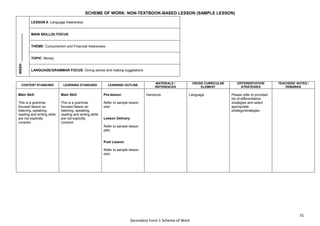
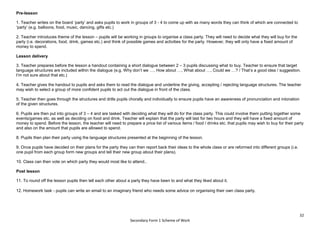
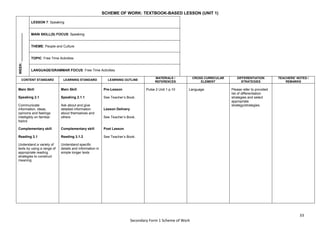
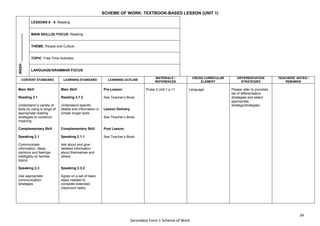
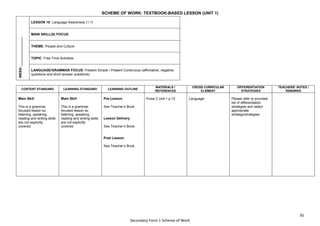
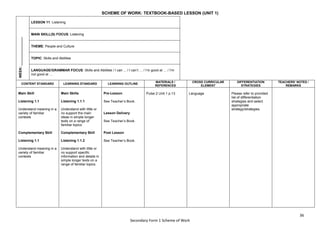
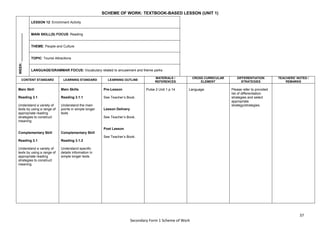
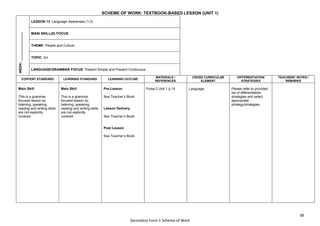
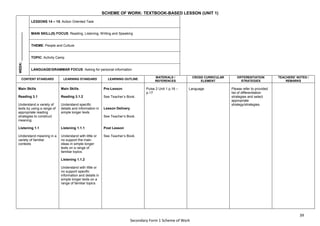
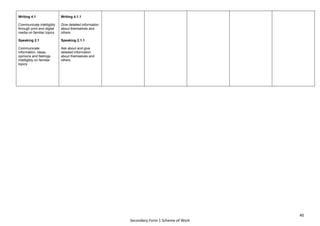
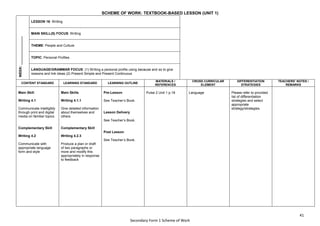
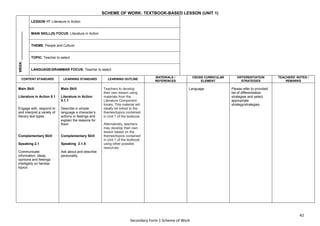
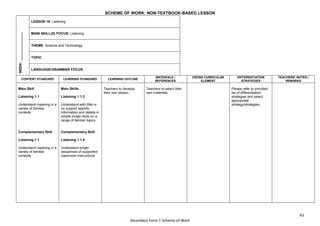
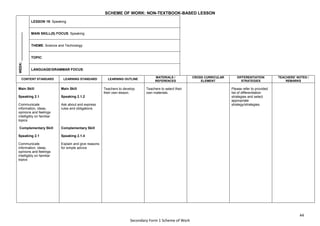
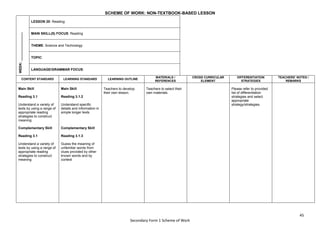
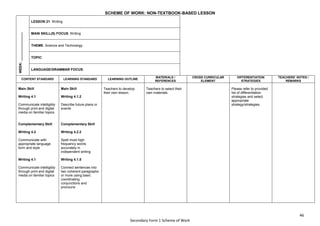
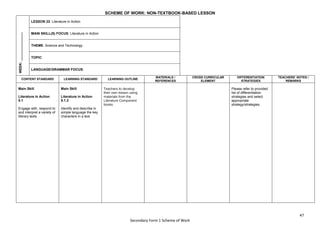
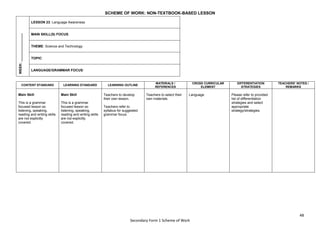
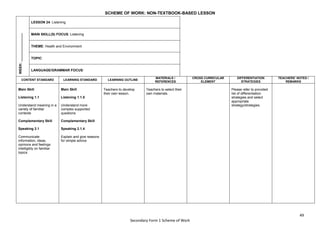
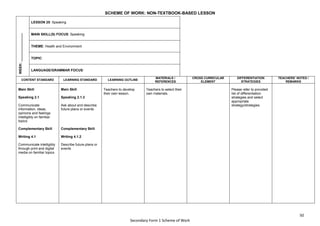
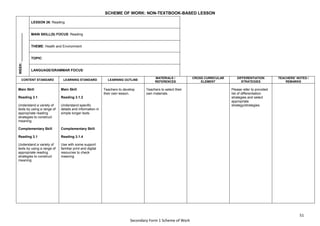
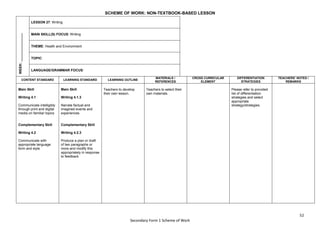
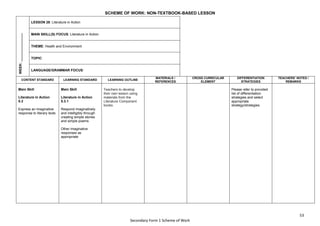
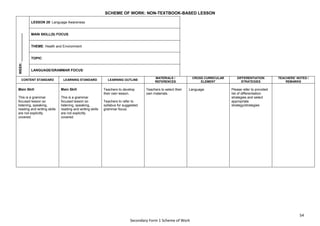
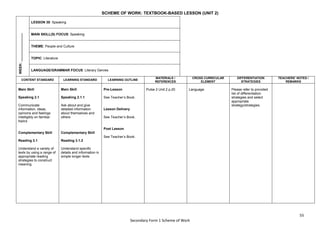
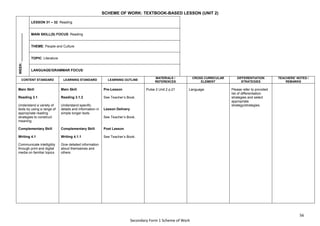
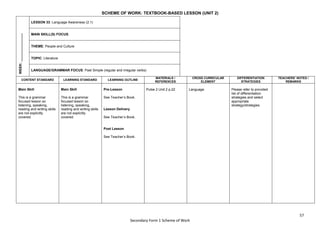
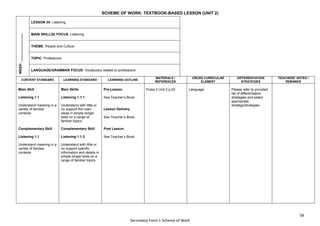
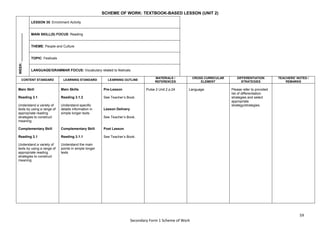
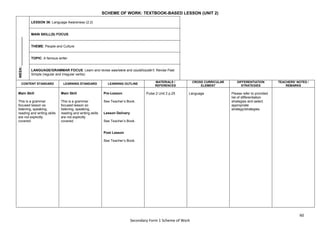
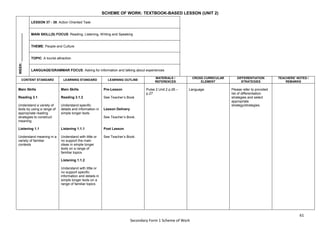
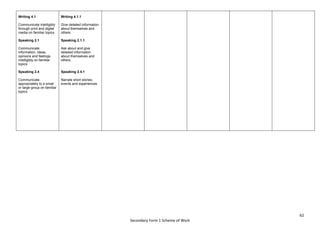
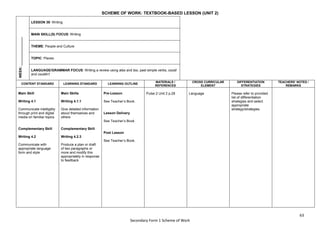
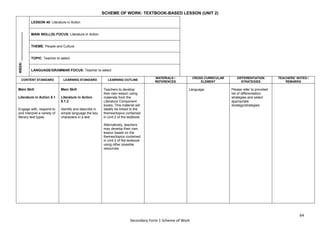
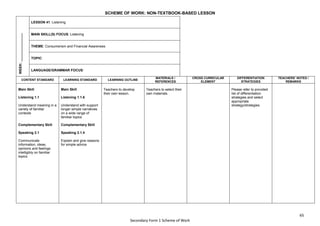
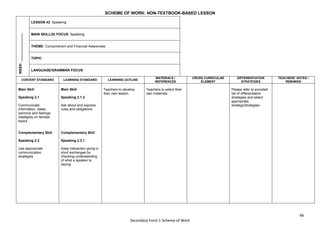
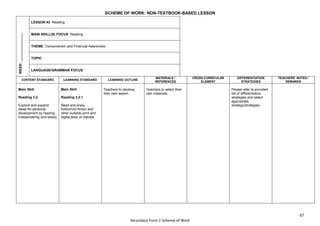
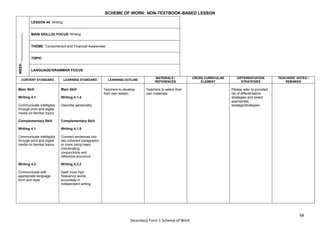
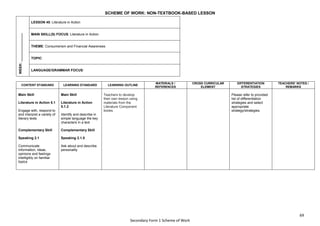
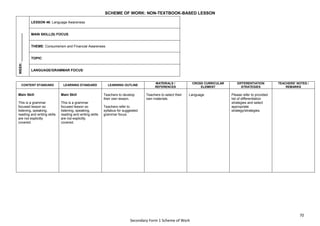
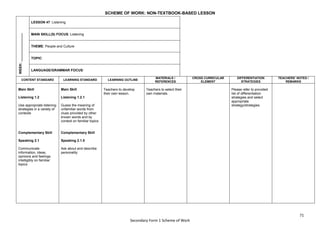
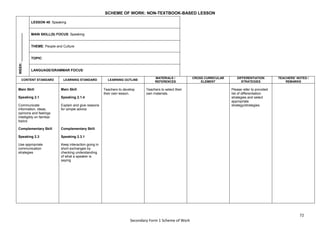
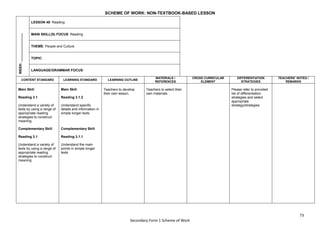
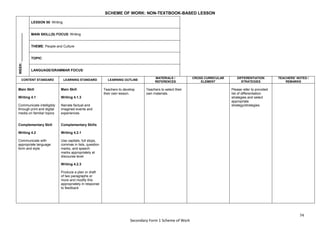
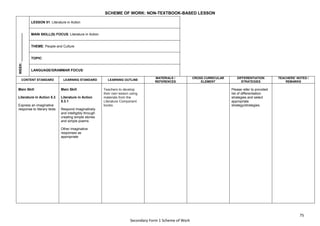
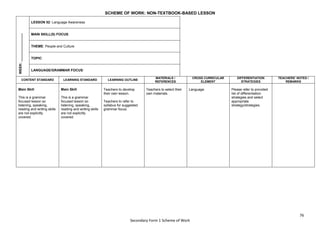
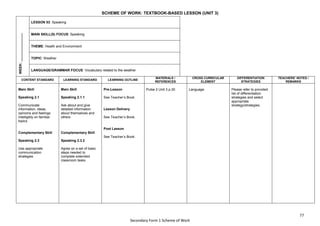
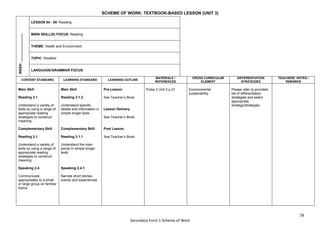
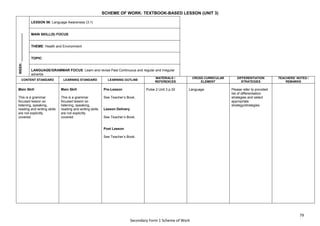
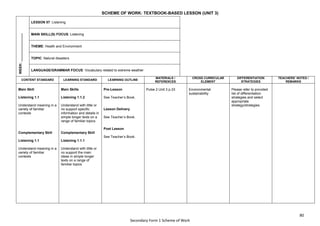
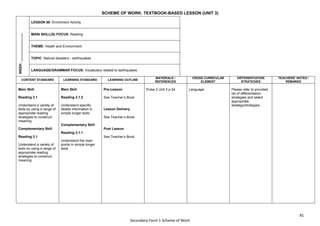
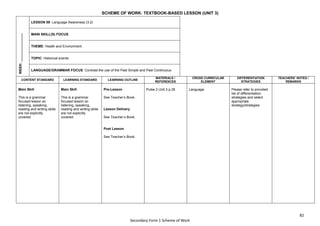
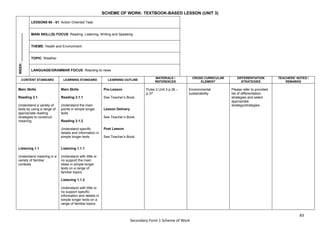
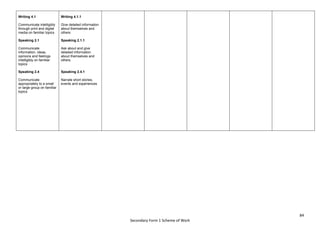
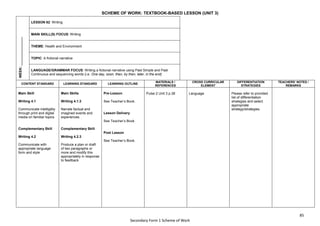
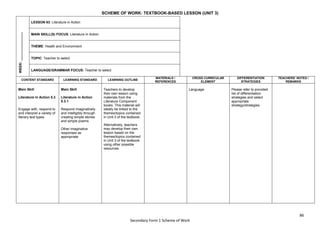
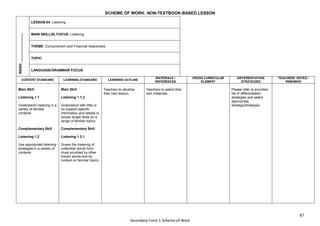
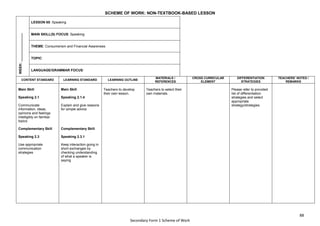
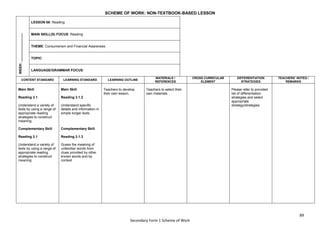
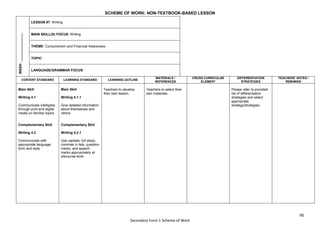
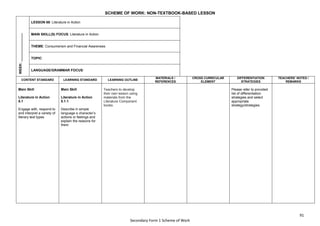
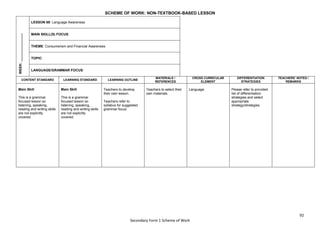
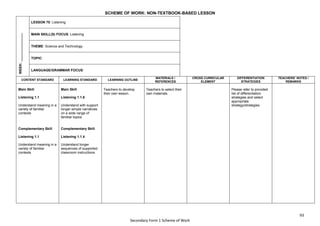
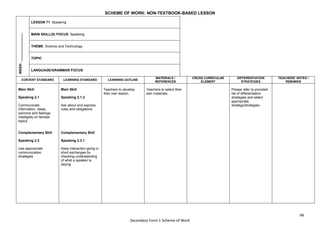
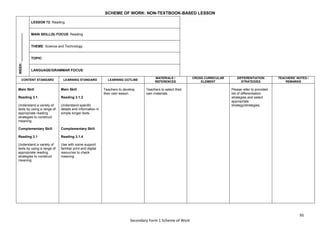
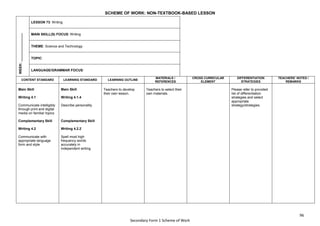
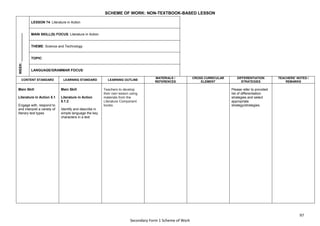
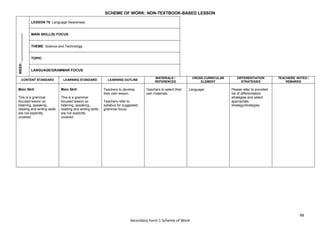
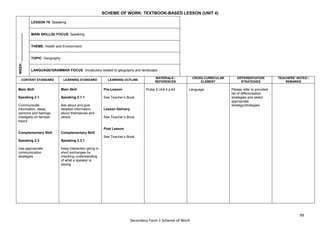
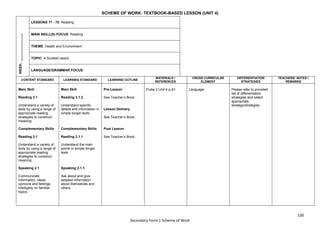
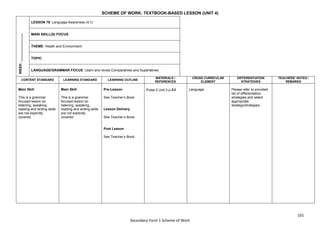
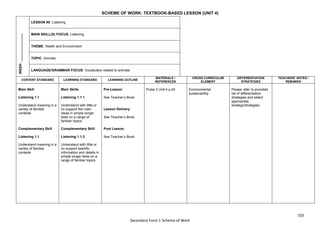
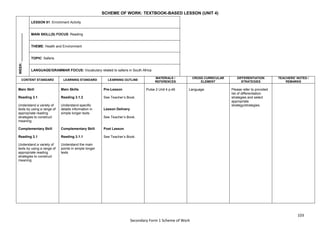
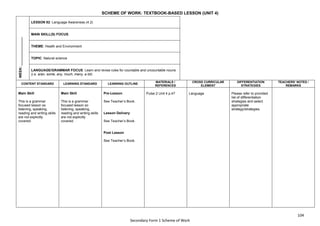
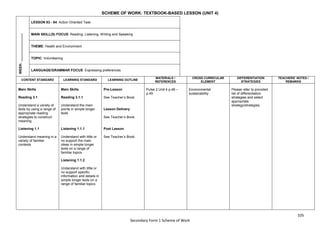
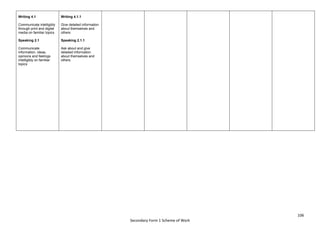
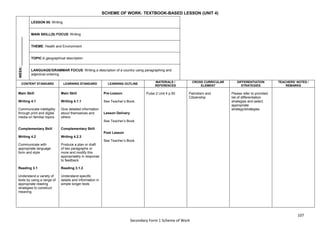
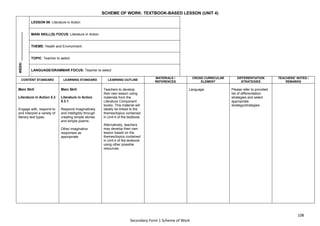
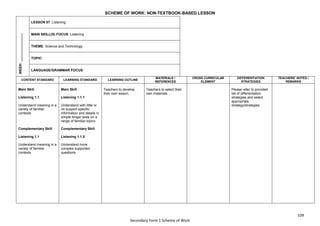
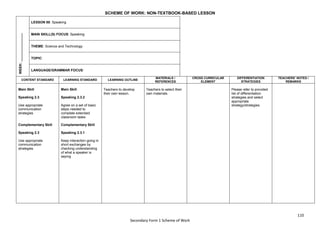
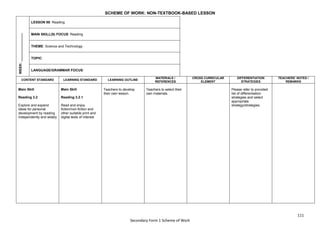
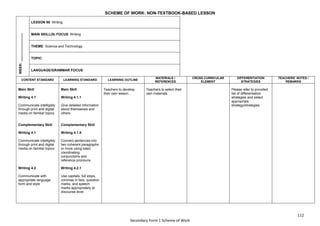
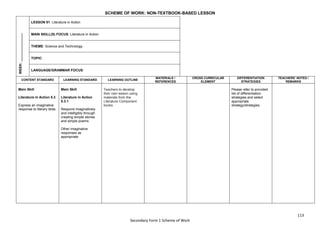
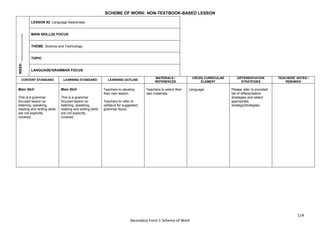
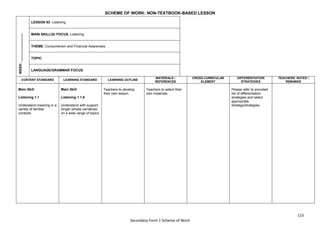
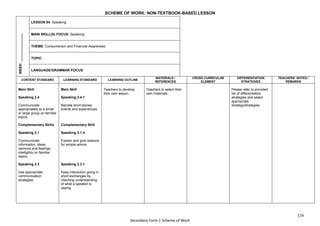
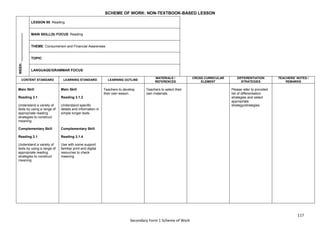
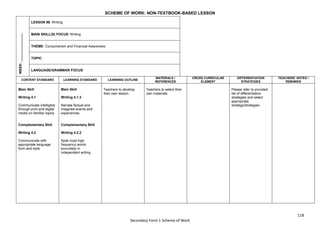
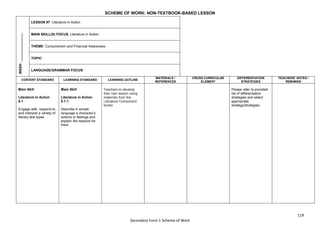
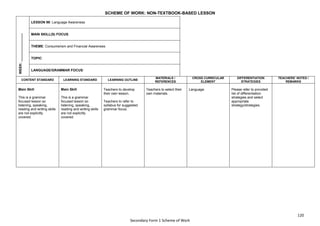
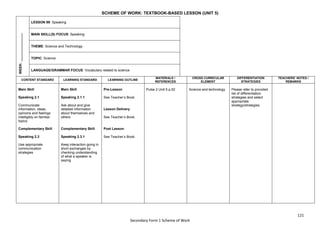
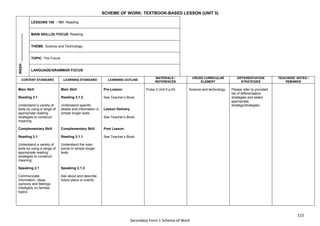
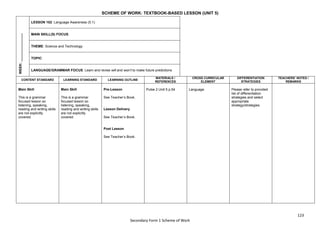
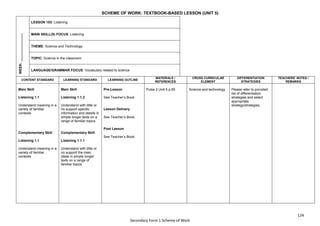
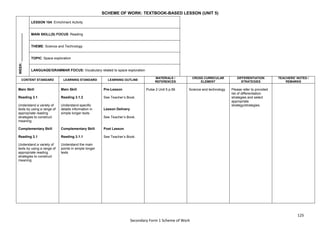
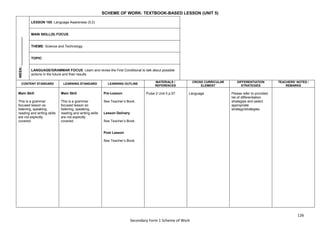
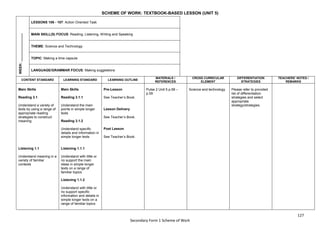
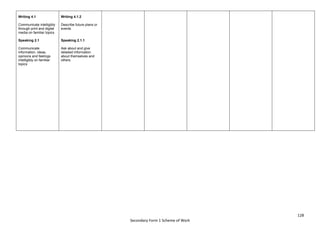
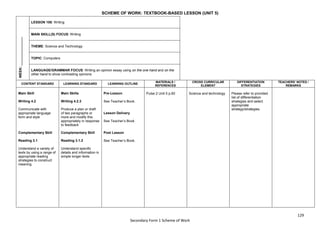
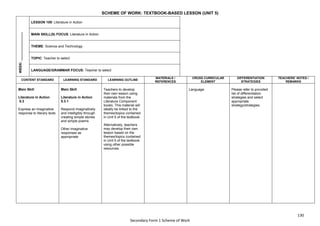
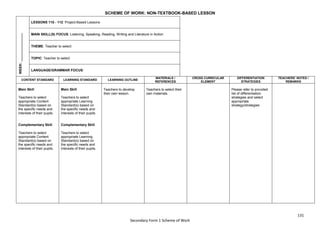
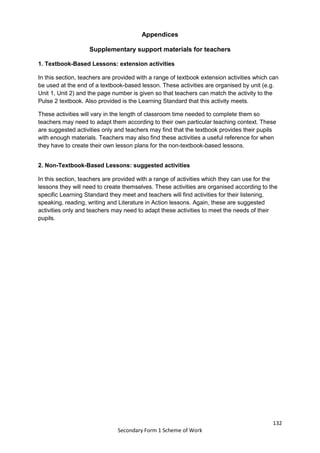
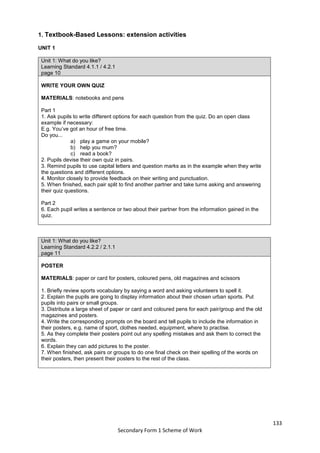
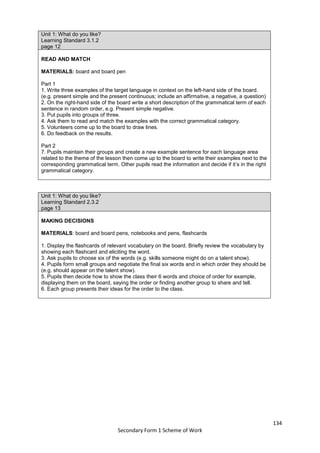
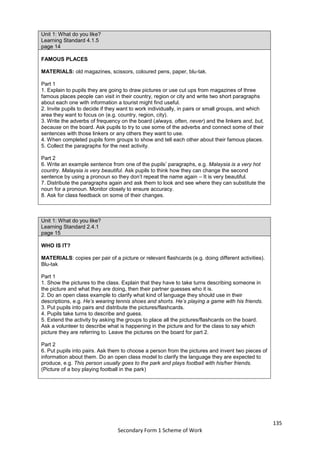
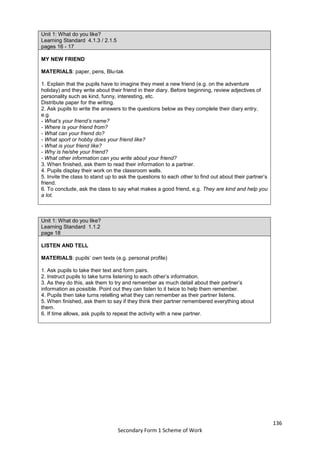
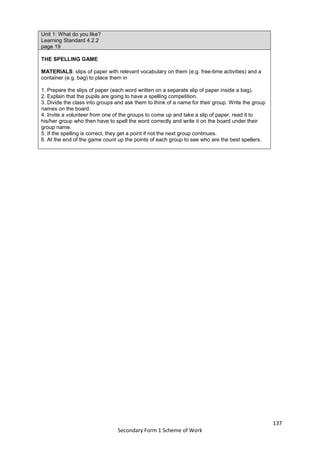
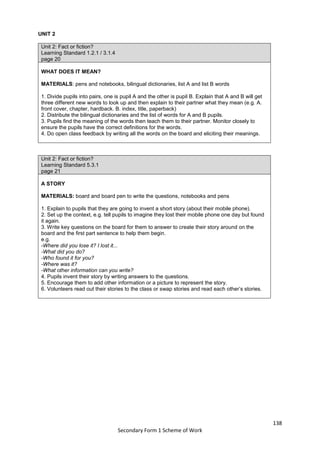
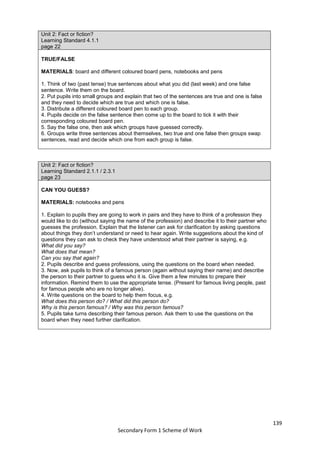
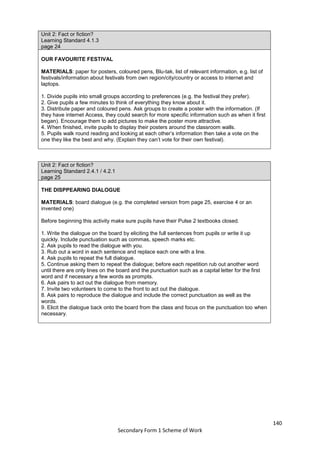
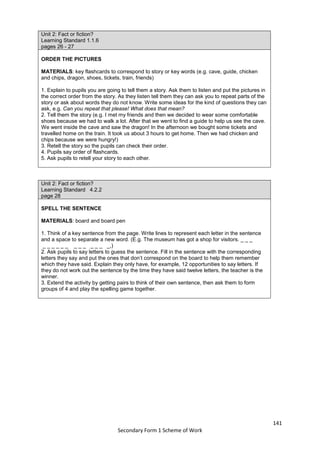
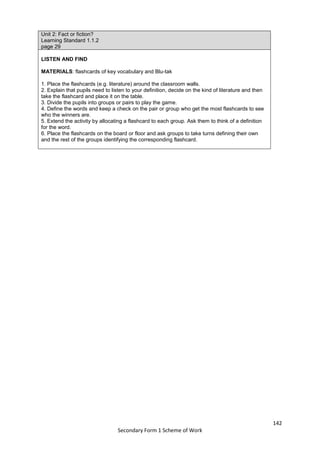
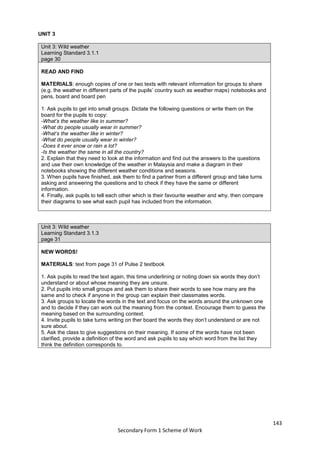
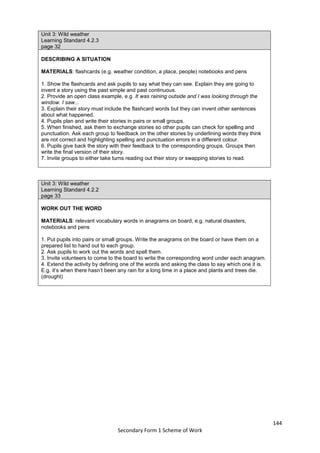
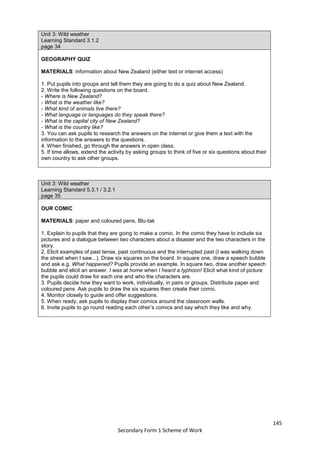
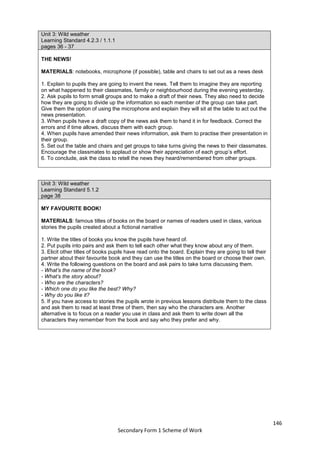
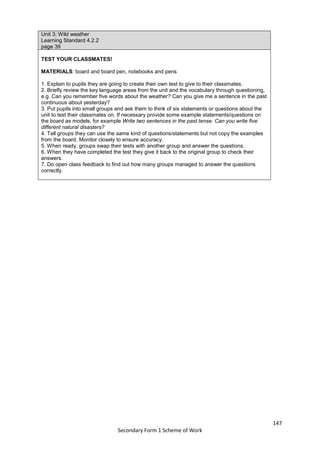
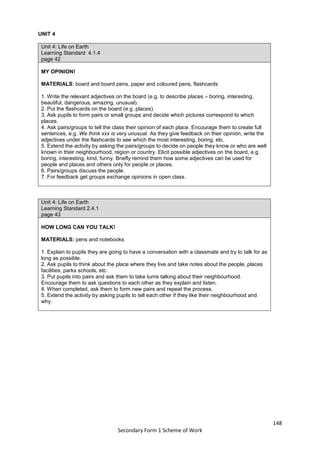
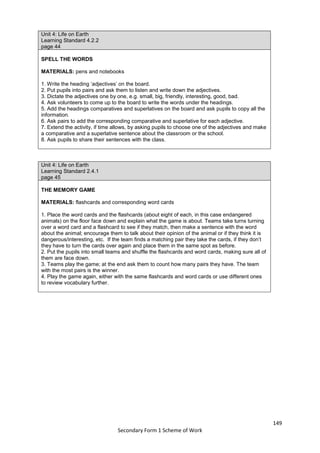
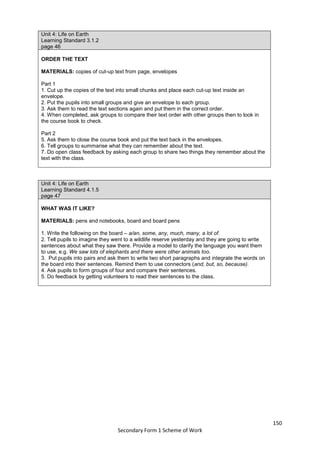
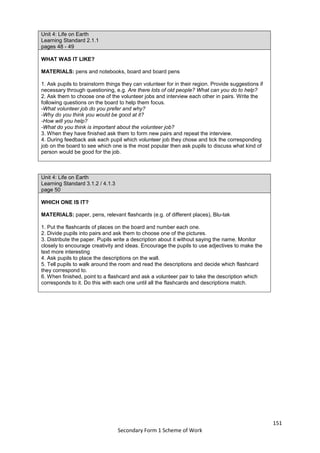
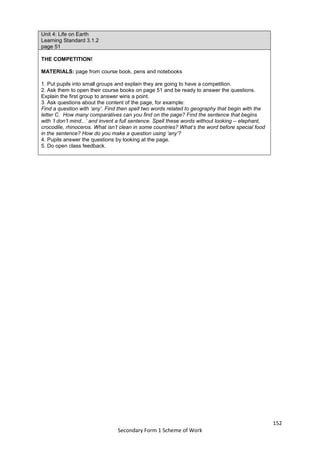
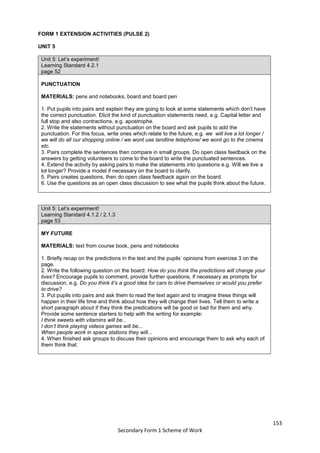
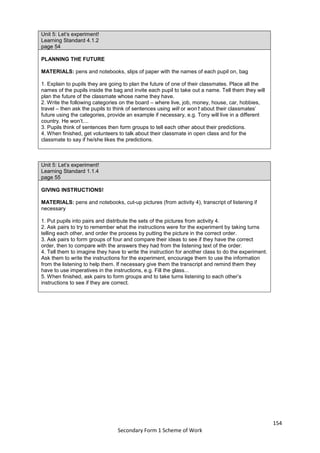
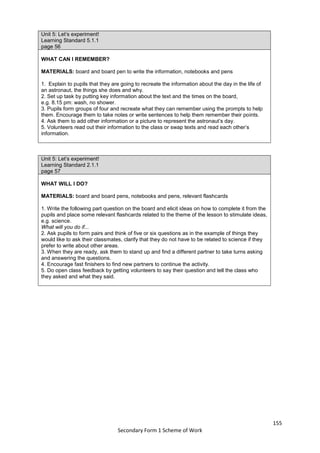
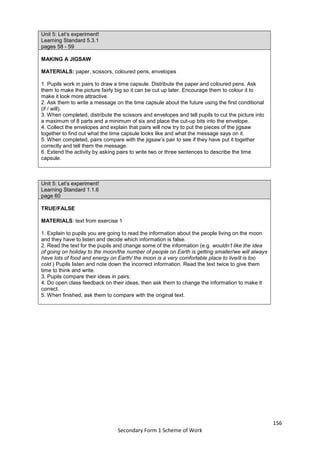
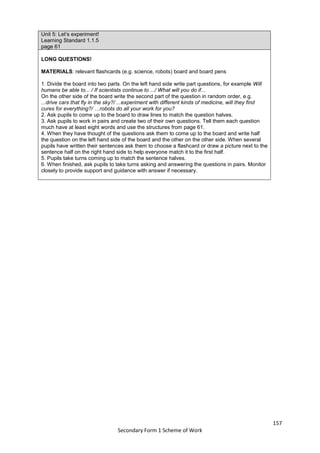
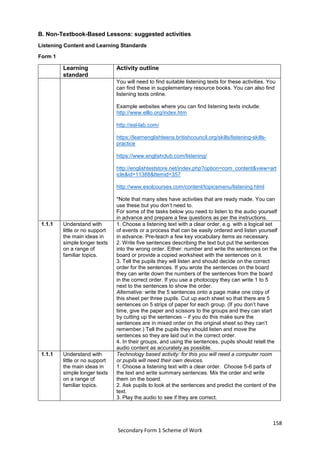
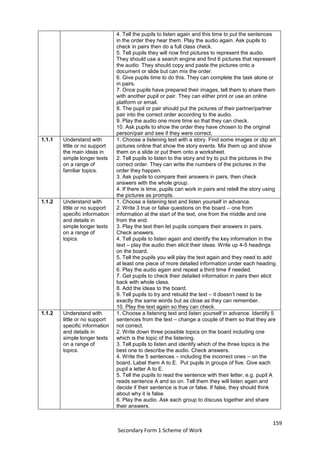
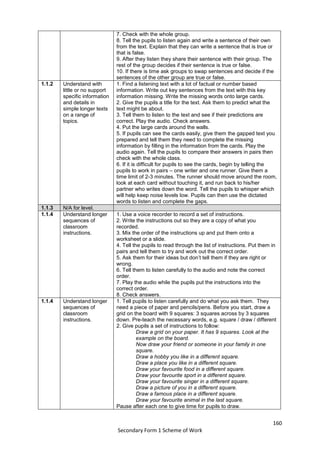
![161
Secondary Form 1 Scheme of Work
3. When they have finished tell them to work in pairs and share
their pictures. Model asking and answering questions: e.g.
Is that you? No it isn’t.
Is that your favourite singer? No it isn’t.
Is that your friend? No it’s my sister.
4. Pupils work in pairs asking and answering questions.
5. If there is time put the pairs together in groups of four. Ask the
pupils to tell each other about their partner. E.g. Ali’s favourite food
is curry. He likes football. His favourite place is the park.
*Pupils could write rather than draw as an alternative.
1.1.4 Understand longer
sequences of
classroom
instructions.
1. Draw some pictures that symbolise instructions on the board
using simple images – or find appropriate images online and stick
them to the board. Examples: someone opening a book; mobile
phone symbol crossed out; a person with their finger to their lips;
pictures of a food items with a cross next them.
2. Ask the pupils to work in pairs. Tell them to try and understand
the classroom rules related to the pictures.
3. Elicit their ideas e.g. open your books; don’t talk please; don’t
eat food in the class please.
4. Ask the pairs of pupils to copy the images onto pieces of paper.
5. Tell them you will read some instructions and when they hear the
instruction related to the picture they should hold it up.
6. Read a set of instructions based around the pictures you have
given them. E.g. Hello class. Today we are going to do some
reading. Please don’t speak when you are reading [pupils hold up
picture] and remember not to eat in class too [pupils hold up
picture]. Now open your books at page 10 please [pupils hold up
picture]. You can continue with instructions such as answer the
questions; now turn to page 15; write down notes etc.
7. Repeat step 6 if necessary.
8. Now ask pupils to practise giving instructions to each other. One
of the pair says the instructions while the other pupil indicates the
pictures then they swap roles.
1.1.5 Understand more
complex supported
questions.
1. Find a listening text and listen yourself in advance.
2. Create 10 questions about the text and their answers.
3. Pick 5 key words from the text and write them on the board. Ask
the pupils to predict the topic of the listening from the key words.
4. Play the audio and ask them to listen and see if they are correct.
5. Let pupils check their ideas in pairs then check with the whole
group.
6. Now write up the 10 questions and 10 answers (or project them
or put them on a worksheet) but mix up the answers.
7. Ask the pupils to work in pairs and see if they can predict which
answer goes with which question.
8. Elicit back their ideas very quickly but don’t correct them.
9. Play the audio again so they can do the matching.
10. Check answers
11. Now ask pupils to identify key words or phrases in the answers
that helped them work out which ones went together.
1.1.5 Understand more
complex supported
questions.
1. Find a listening text and listen yourself in advance. Write 6-8
questions about the text and their answers.
2. Choose some images from the source material or images linked
to the listening.
3. Show the pupils the images and ask them to predict what the text
is about.
4. Play the text and ask pupils to check their predictions.
5. Check answers.
6. Write on the board the 6-8 answers to your pre-prepared
questions. Tell pupils to work in pairs. Tell them to read the
answers on the board and see if they can work out what the](https://image.slidesharecdn.com/sowform1-210823035614/85/Scheme-of-Work-form-1-163-320.jpg)
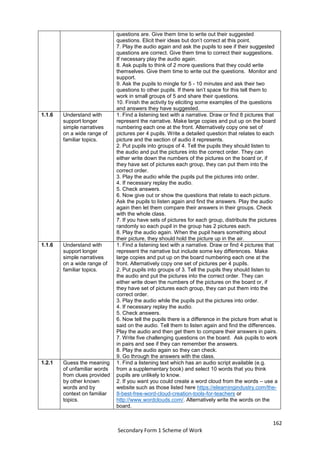
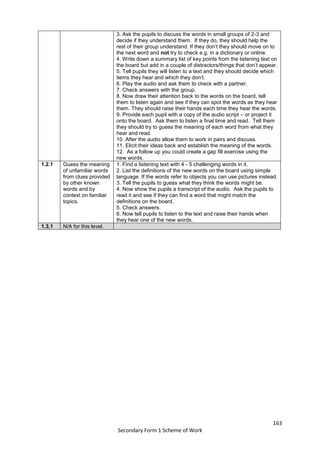
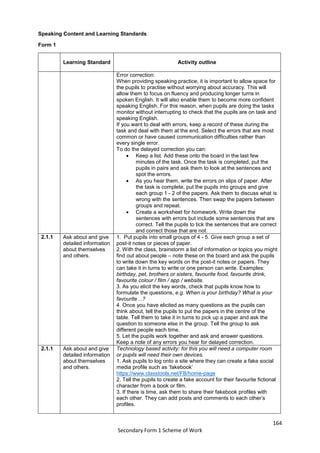
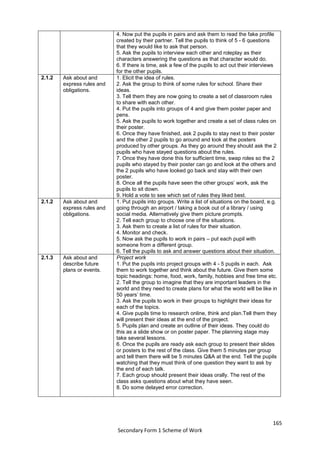
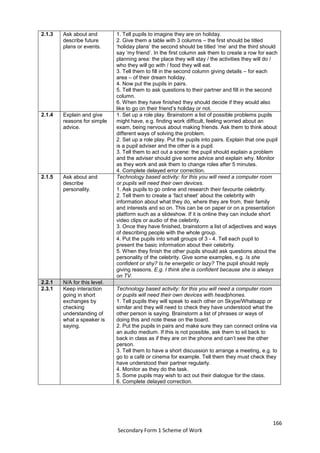
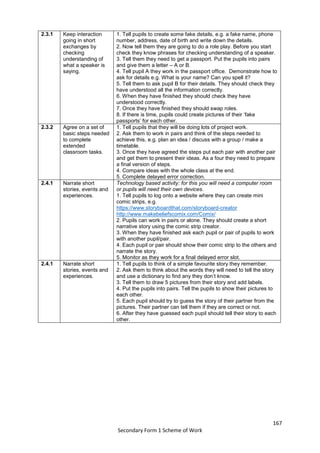
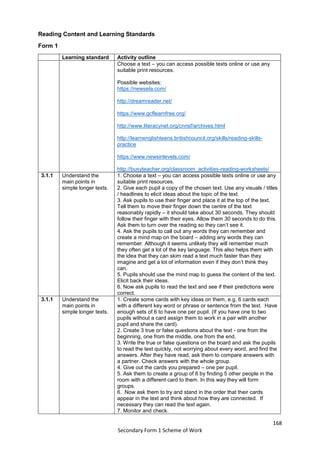
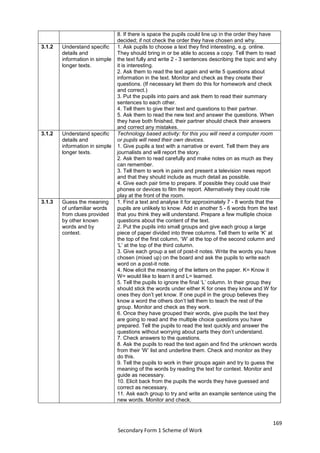
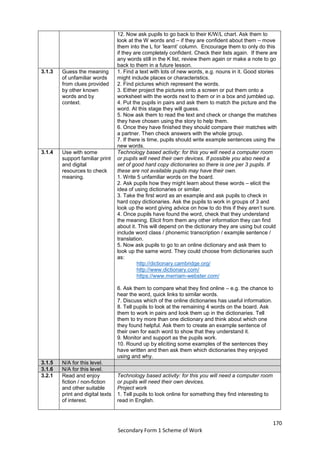
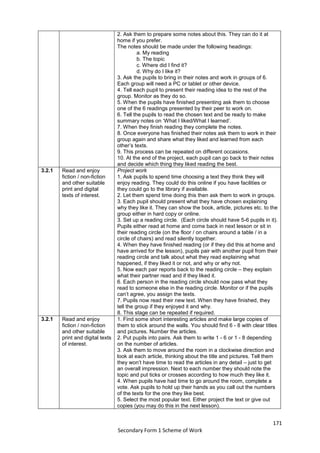

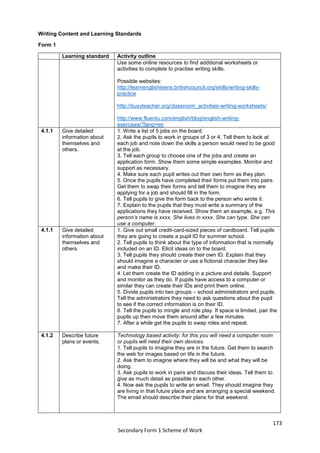
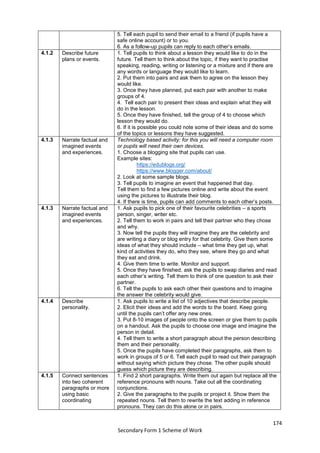
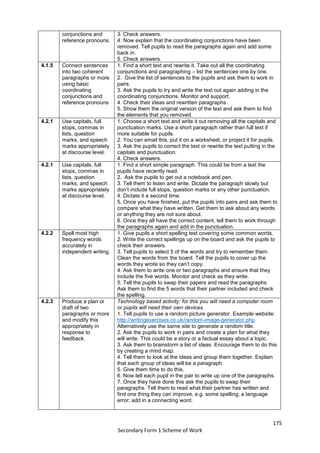
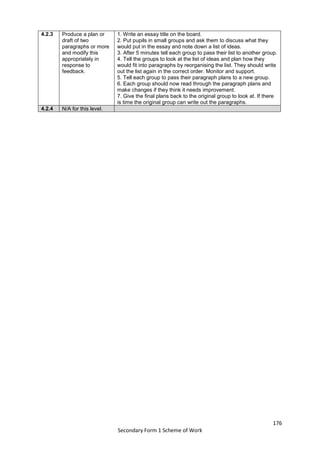
![177
Secondary Form 1 Scheme of Work
Literature in Action Content and Learning Standards
Form 1
Learning standard Activity outline
Choose a text – you can access possible texts online or use any
suitable print resources.
Possible websites:
http://www.eslfast.com/
http://english-e-books.net/ Select book then ‘read online’ button for
access- this needs to be done online with a device or PC.
5.1.1 Describe in simple
language a
character’s actions
or feelings and
explain the reasons
for them.
1. Find a simple narrative with a character who does lots of things.
2. Create a simple table with the headings ‘Actions’ and ‘Reasons’.
Pre-teach these words. Add the subheadings xxxx did this….under
actions and because….under reasons.
3. When the pupils have read the story ask them to work in pairs.
Tell them to choose a character and fill in the ‘actions’ column,
listing all the key actions that the character did. They can choose
different characters if there is more than one in the story.
4. When they have finished, ask them to pass their paper to a
different pair.
5. The new pair should read the actions listed and in the ‘reasons’
column write down why the character did them.
6. Tell them to pass the paper back to the original pair to check if
they agree.
5.1.1 Describe in simple
language a
character’s actions
or feelings and
explain the reasons
for them.
Technology based activity: for this you will need a computer room
or pupils will need their own devices.
1. After reading a story ask the pupils to think about how the
person felt at different points in the story.
2. Tell the pupils to open an app tool for messaging or writing e.g.
email / text / messaging app. They should open a new message or
document.
3. Tell them to choose 4 - 5 emoticons (smiley faces or symbols)
that show the events / feelings of their character and put them into
a message.
4. Ask the pupils to work in pairs. They can either send their
message to their partner or simply show them the draft on their
own device. They should tell their partner what each emoticon
represents.
5.1.2 Identify and
describe in simple
language the key
characters in a text.
1. Find a text with at least 3 - 4 significant characters in it.
2. Create a mind map for each key character with the name in the
centre. Include 3 - 4 mind maps. Write a set of characteristics /
adjectives or actions in a list not linked to any of the mind maps.
3. Ask the pupils to read the story and decide which of the words
should be added to which mind map.
4. Give pupils time to read and put the words onto the mind maps.
5. Ask them to compare their ideas with a partner.
6. Check answers together.
7. Now ask pupils to work together and create a description of one
of the characters. Give some stem sentences adapting these to the
context e.g. Harry is….. He likes… In the story he…..because…..
8. Check their ideas.
5.1.2 Identify and
describe in simple
language the key
characters in a text.
1. Ask the pupils to choose a favourite character from a story they
have read recently. Alternatively ask them to read a short story and
choose a character they like.
2. Ask them to complete a writing frame. Put this on the board or
give it to them as a worksheet with gaps for them to write in.
My favourite character is…..
He/she is…..[what kind of character]](https://image.slidesharecdn.com/sowform1-210823035614/85/Scheme-of-Work-form-1-179-320.jpg)
![178
Secondary Form 1 Scheme of Work
He/she….[what does he/she look like]
In the story he/she….[what important things do they do?]
I like this character because….
3. Now ask pupils to change some of their sentences into
questions. Give examples. E.g. He is tall and he has dark hair
becomes Is he tall or short? She is very kind becomes Is she kind
or selfish? Why?
4. Give pupils time to write the questions and check and monitor as
they do.
5. Put pupils into pairs. Tell them to ask their questions and see if
the other pupil can answer correctly.
5.1.2 Identify and
describe in simple
language the key
characters in a text.
Project work
1. Explain that you will be making a ‘character wall’ in the project.
2. With pupils design a ‘character ID’ template. This could include
basic details but also character, interests, key events etc. Leave
space for a picture. You can have an electronic template or a paper
one.
3. Each time the pupils read a narrative / story / part of a narrative
ask them to choose a character and fill in the character ID. If this is
on paper they can draw a picture. If it is electronic they can find a
picture they think fits the character.
4. When they have finished they should find another pupil with the
same character and see if they have similar information.
5. Each pupil should keep their character IDs. They can go in an
electronic folder or a paper folder depending on how they are
working.
6. At the end of the project, ask pupils to find all their character IDs
and look at them.
7. Tell them to choose the ‘best’ and ‘worst’ character. Put them
into small groups and ask them to explain to their group who they
have chosen and why. They should see if anyone else in the group
has selected the same characters.
8. If you have time ask each pupil to choose their favourite ID and
make a wall display or gallery of characters for everyone to look at.
(If the pupils have used IT they could bring in a print out of their
favourite.)
5.2.1 N/A for this level.
5.3.1 Respond
imaginatively and
intelligibly through
creating simple
stories and simple
poems.
Other imaginative
responses as
appropriate.
Technology based activity: for this you will need a computer room
or pupils will need their own devices.
1. Ask pupils to log on to the following site and follow the
instructions adding in names, adjectives and so on to the correct
boxes. http://www.readathon.org/the-
storymaker/?gclid=CKWWgOLtrtQCFSIG0wodjjsKLw
2. Allow them to create a story. They could choose a theme or
character from something they have read. Monitor what they are
doing carefully.
3. Ask them to work with a partner and read each other’s stories.
4. When they have finished tell them to try and retell the story to
their partner.
5. Their partner should correct them if possible.
6. When they finish they can check the original stories to see if they
are correct.
5.3.1 Respond
imaginatively and
intelligibly through
creating simple
stories and simple
poems.
1. Find a story for pupils to read. Choose one with some tasks or
worksheets or create these so the pupils read carefully.
2. When they finish ask them to work in small groups.
3. Give them large poster paper and pens.
4. Ask them to choose one part of the story and create a picture
including as many details as they can.
5. Give them time to complete their pictures.](https://image.slidesharecdn.com/sowform1-210823035614/85/Scheme-of-Work-form-1-180-320.jpg)
